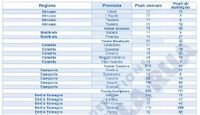The Italian education sector is on the brink of significant changes as it awaits the publication of the implementing decrees related to the INDIRE support courses, mandated by Decree-Law 71/2024. The National Observatory for Inclusion has expressed a positive opinion on these new training pathways, which are crucial for enhancing educational support for students with disabilities.
Honorable Mario Pittoni emphasized the importance of the next steps between the Ministry of Education (MIM) and the Ministry of University and Research (MUR), highlighting that these decrees will clarify the availability of positions for support courses distributed nationally. Draft decrees indicate 52,622 positions are available across kindergarten, primary, and lower secondary schools, with a significant concentration in northern regions such as Lombardy and Piedmont.
However, uncertainty looms regarding the allocation of these positions, particularly concerning the possibility of multiple pre-registrations. This point awaits official confirmation and could greatly influence the strategies of aspiring teachers. The publication of the decrees is anticipated within this week, promising to answer many questions that have been circulating on social media.
In spring 2025, the Minister of Education, Giuseppe Valditara, announced the opening of the call for applications for the TFA Sostegno training course, aimed at future support teachers. It is expected that at least 32,000 positions will be available for support teachers by 2025. The School Decree aims to address some structural problems within the Italian school system, as the National Association of Teachers and Trainers (ANIEF) has called for interventions to guarantee permanent hires and reduce job insecurity.
Alongside the TFA Sostegno, new INDIRE courses are set to launch for teachers with at least three years of experience and for those holding foreign qualifications not yet recognized in Italy. The deadline for these INDIRE courses is expected to be December 31, 2025, with a total of 71,788 places available for teachers. These developments are crucial as they aim to resolve some of the pressing issues within the Italian education system.
On April 9, 2025, the Scientific Technical Committee of the Permanent Observatory for School Inclusion gave a favorable opinion on the ministerial decrees concerning new specialization paths for teaching support. According to Minister Valditara, this approval marks a crucial step in guaranteeing the right to education for students with disabilities, emphasizing the importance of the contributions from those directly involved in the inclusive educational process.
Official estimates suggest that around 50,000 teachers will be involved by September 1, 2024, with an additional pool of 25,000-30,000 teachers expected to meet the requirements during the current school year. This number also includes approximately 10,000 specialists who have qualifications obtained abroad. For these individuals, access to training courses is contingent upon formally renouncing any prior recognition requests and resolving any pending litigation.
Foreign qualifications must be obtained from legally accredited universities and should either have a duration of at least 1,500 hours or confer at least 60 CFUs (Credit Formative Universitari). The courses for teachers with three years of service will provide 40 CFUs without requiring an internship, while the training load for foreign specialists will be 48 CFUs, including 12 dedicated to internships, which are mandatory only for those without at least one year of support experience in Italy.
The courses for teachers with three years of service will last a minimum of four months, while the duration for foreign specialists has yet to be determined. The maximum costs established for these courses are set at 1,500 euros for teachers with three years of service and for foreign specialists needing to complete 48 CFUs, and 900 euros for those acquiring 36 CFUs.
In addition to these developments, the community "Uniti Per Indire – INsieme DIventeremo REaltà" has emerged as a supportive network for teachers navigating these changes. Daniela Nicolò, the spokesperson for this community, highlighted the importance of collaboration among educators to improve teaching quality and foster a supportive environment. The community aims to share best practices and promote inclusive teaching, striving to build a solid network of professionals who can grow together.
Despite the positive outlook, there are concerns regarding the potential impact of the INDIRE courses on established teachers. Some specialists fear that these new pathways might undermine their qualifications, with organizations like UIL Scuola deeming the INDIRE courses an unacceptable shortcut. The ongoing discussions reflect the complexities and varying perspectives within the educational community.
As the Italian education sector anticipates the official publication of these decrees, the outcomes will be pivotal in shaping the future of inclusive education in Italy. The decisions made in the coming days are expected to clarify the roles and responsibilities of teachers, ensuring that the educational needs of all students, especially those with disabilities, are met effectively.
In conclusion, the impending changes in the Italian education system, marked by the introduction of new training pathways and the emphasis on inclusivity, represent a significant step forward. The collaboration between various stakeholders, including educators, policymakers, and community organizations, will be essential in navigating this transition and ensuring a brighter future for all students.







